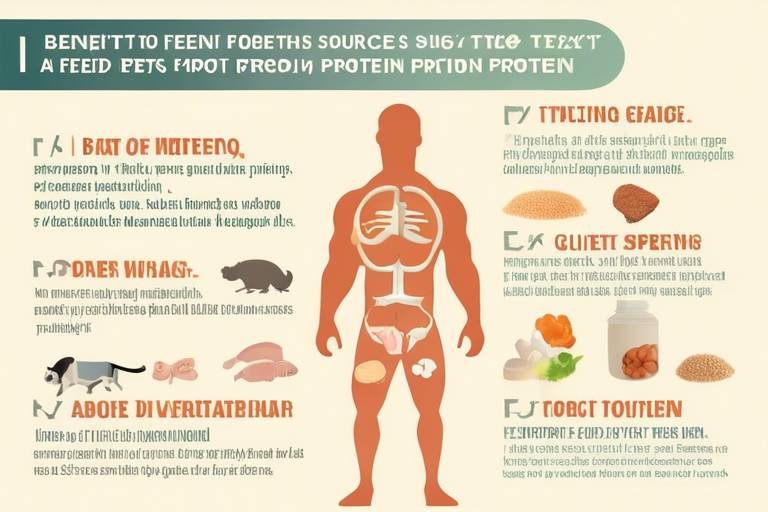The Role of Nutrition in Managing Chronic Diseases
Nutrition is more than just a buzzword; it's a cornerstone of health that can dramatically influence the course of chronic diseases. Imagine your body as a finely tuned machine, where each nutrient plays a specific role in keeping everything running smoothly. When the fuel you provide—your food choices—is of high quality, your machine operates efficiently. Conversely, poor dietary habits can lead to a breakdown, especially when it comes to chronic diseases like diabetes, heart disease, and obesity.
Chronic diseases are long-lasting conditions that often require ongoing medical attention, and they affect millions of people worldwide. According to the World Health Organization, chronic diseases account for 71% of all deaths globally, making them a significant public health concern. This staggering statistic highlights the urgent need for effective management strategies, and nutrition is at the forefront of these efforts. It's not just about what you eat; it's about how your dietary choices can either mitigate or exacerbate these conditions.
When you think about nutrition, consider it a powerful tool in your health arsenal. It can help you maintain a healthy weight, regulate blood sugar levels, and even lower cholesterol. But how does it actually work? The answer lies in the intricate relationship between the food you consume and the biological processes that govern your health. For instance, a diet rich in fruits, vegetables, whole grains, and lean proteins can provide essential nutrients that bolster your immune system and reduce inflammation—two critical factors in managing chronic diseases.
Moreover, the impact of nutrition extends beyond individual health; it affects communities and healthcare systems at large. By prioritizing healthy eating, we can reduce the burden of chronic diseases on public resources, improve quality of life, and enhance overall well-being. Think of it as a ripple effect—when individuals make better dietary choices, it contributes to a healthier society.
In this article, we will dive deeper into the significance of nutrition in managing chronic diseases. We'll explore key nutrients that are particularly beneficial, discuss various dietary patterns, and provide practical strategies for incorporating healthy eating into everyday life. So, whether you're looking to prevent chronic diseases or manage existing conditions, understanding the role of nutrition is your first step towards a healthier future.
- What are chronic diseases? Chronic diseases are long-lasting health conditions that typically require ongoing medical attention and can significantly impact quality of life.
- How does nutrition affect chronic diseases? Proper nutrition can help manage symptoms, reduce the risk of complications, and improve overall health in individuals with chronic diseases.
- What are some key nutrients for managing chronic diseases? Important nutrients include vitamins, minerals, antioxidants, and healthy fats, all of which play vital roles in supporting the immune system and reducing inflammation.
- What dietary patterns are beneficial for chronic disease management? Diets such as the Mediterranean and DASH diets are well-researched and have been shown to provide significant health benefits.

Understanding Chronic Diseases
Chronic diseases are more than just a medical term; they are a reality for millions of people around the world. Defined as long-lasting conditions that typically persist for three months or longer, chronic diseases often require ongoing medical attention and can significantly impact a person's quality of life. Some of the most common chronic diseases include heart disease, diabetes, chronic respiratory diseases, and cancer. These conditions are not only prevalent but are also on the rise, making them a pressing public health concern.
According to the World Health Organization (WHO), chronic diseases are responsible for approximately 71% of all deaths globally. This staggering statistic highlights the urgent need for effective management and prevention strategies. The impact of chronic diseases extends beyond individual health; they also place a considerable burden on healthcare systems and economies. In fact, the economic cost associated with chronic diseases can be astronomical, encompassing direct medical expenses as well as indirect costs such as lost productivity.
Understanding chronic diseases involves recognizing their multifaceted nature. They often stem from a combination of genetic, environmental, and lifestyle factors. For instance, poor dietary choices, physical inactivity, and tobacco use are significant contributors to the development of these conditions. Moreover, chronic diseases can lead to a cascade of complications, making them even more challenging to manage. For example, someone with diabetes may also develop heart disease or kidney issues, creating a complex web of health challenges.
To illustrate the prevalence of chronic diseases, consider the following table:
| Chronic Disease | Global Prevalence (%) |
|---|---|
| Heart Disease | 16.7% |
| Diabetes | 8.8% |
| Chronic Respiratory Diseases | 3.5% |
| Cancer | 18.1% |
As you can see, the numbers are alarming. The good news is that many chronic diseases are preventable or manageable through lifestyle changes, particularly in nutrition. By understanding the underlying causes and risk factors associated with chronic diseases, individuals can take proactive steps toward improving their health. This is where the role of nutrition comes into play, serving as a powerful tool in the prevention and management of these conditions.
In summary, chronic diseases represent a significant challenge to public health, affecting millions of lives and straining healthcare resources. By acknowledging their prevalence, understanding their causes, and focusing on prevention strategies like nutrition, we can work toward a healthier future for ourselves and our communities.

The Importance of Nutrition
Nutrition is the cornerstone of good health, influencing everything from our energy levels to how well our bodies can fend off diseases. Think of your body as a high-performance vehicle; just as a car requires the right fuel to run efficiently, our bodies need the right nutrients to function optimally. When we talk about nutrition, we’re not just discussing calories or macronutrients; we’re diving into a world where food choices directly impact our health and well-being.
Good nutrition is essential for maintaining health and preventing disease. It serves as a powerful tool in managing chronic conditions, such as diabetes, heart disease, and obesity. By making informed dietary choices, individuals can not only improve their quality of life but also reduce the risk of complications associated with these conditions. For instance, a diet rich in fruits, vegetables, whole grains, and lean proteins can help stabilize blood sugar levels, lower cholesterol, and maintain a healthy weight.
Moreover, nutrition is not a one-size-fits-all approach. Each individual has unique dietary needs based on factors like age, gender, activity level, and existing health conditions. This variability means that personalized nutrition plans can be incredibly effective. By tailoring dietary choices to meet specific health goals, individuals can experience transformative results. For example, someone with hypertension might benefit from a DASH diet (Dietary Approaches to Stop Hypertension), which emphasizes fruits, vegetables, and low-fat dairy, while someone with diabetes may focus on low-glycemic index foods.
Another critical aspect of nutrition is its role in mental health. Recent studies have shown that what we eat can affect our mood and cognitive function. Nutrient-rich foods can enhance brain health, improve memory, and even help alleviate symptoms of anxiety and depression. Incorporating foods high in omega-3 fatty acids, such as salmon and walnuts, can boost brain function and promote mental clarity.
To illustrate the impact of nutrition on chronic disease management, let’s look at a simple comparison of dietary patterns:
| Dietary Pattern | Benefits |
|---|---|
| Mediterranean Diet | Rich in healthy fats, whole grains, and antioxidants; linked to reduced risk of heart disease and improved brain health. |
| DASH Diet | Focuses on reducing sodium intake; effective in lowering blood pressure and improving heart health. |
| Plant-Based Diet | Emphasizes fruits, vegetables, and legumes; associated with lower rates of chronic diseases and improved weight management. |
In summary, the importance of nutrition cannot be overstated. It is not merely about eating to survive; it’s about making conscious choices that promote longevity and vitality. By prioritizing a balanced diet filled with essential nutrients, we can empower ourselves to take control of our health and manage chronic diseases more effectively.
Key Nutrients for Health
When it comes to maintaining our health and managing chronic diseases, nutrients play a pivotal role, acting as the building blocks of our bodies and the fuel that keeps us going. Think of nutrients as the superheroes of our diet, each with unique powers that help us fend off illnesses and maintain optimal health. Among these, certain vitamins, minerals, and antioxidants stand out for their significant contributions to our well-being.
First off, let’s talk about vitamins. These organic compounds are crucial for various bodily functions. For instance, Vitamin C is not just a cold fighter; it plays a vital role in the immune system and helps in the absorption of iron. On the other hand, Vitamin D is essential for bone health and can even improve mood. It’s fascinating how a simple nutrient can have such far-reaching effects!
Then, we have minerals. These inorganic elements are equally important. Calcium, for example, is well-known for its role in bone health, but did you know it also helps in muscle function and nerve signaling? Magnesium is another key player, aiding in over 300 biochemical reactions in the body, including energy production and regulation of muscle and nerve function. Without these minerals, our bodies would struggle to perform at their best.
Now, let’s not forget about antioxidants. These compounds are like the body’s defense team, protecting our cells from oxidative stress caused by free radicals. Free radicals are unstable molecules that can lead to chronic diseases such as cancer and heart disease. Antioxidants help neutralize these harmful molecules, reducing the risk of chronic conditions. Foods rich in antioxidants include berries, nuts, and dark leafy greens. Incorporating these into your diet can be a delicious way to boost your health!
To sum it up, the key nutrients that contribute to health and the management of chronic diseases include:
- Vitamins: Essential for immune function, energy production, and overall health.
- Minerals: Vital for bone health, muscle function, and metabolic processes.
- Antioxidants: Protect against oxidative stress and reduce the risk of chronic diseases.
Understanding the role of these nutrients is just the beginning. The next step is to ensure that we are getting enough of them through our diets. This can be achieved by focusing on a varied and balanced diet that includes a wide range of foods. By doing so, we not only support our health but also enhance our ability to manage any chronic conditions that may arise.
Incorporating these nutrients into your daily meals doesn’t have to be complicated. A colorful plate filled with fruits, vegetables, whole grains, lean proteins, and healthy fats can provide a wealth of these essential nutrients. So, the next time you sit down for a meal, think about what you’re putting on your plate and how it contributes to your health journey!
Vitamins and Minerals
When it comes to managing chronic diseases, are the unsung heroes of our diets. These essential nutrients play a pivotal role in supporting our body's functions, from boosting our immune system to aiding in the repair of tissues. Imagine your body as a finely tuned machine; without the right fuel, it simply can't perform at its best. Vitamins and minerals are that fuel, ensuring that every cog in the machine works smoothly.
For individuals grappling with chronic diseases, the importance of these nutrients cannot be overstated. They help mitigate inflammation, support metabolic processes, and can even enhance the efficacy of medications. For instance, Vitamin D has been linked to improved immune response, while magnesium plays a critical role in regulating blood sugar levels. To put it simply, a deficiency in these nutrients can lead to a cascade of health issues, exacerbating existing conditions and making recovery a daunting task.
Let’s break down some of the key vitamins and minerals that are particularly beneficial:
- Vitamin C: Known for its immune-boosting properties, Vitamin C is crucial for the repair of tissues and the enzymatic production of certain neurotransmitters.
- Vitamin D: Often dubbed the "sunshine vitamin," it not only supports bone health but also plays a significant role in immune function.
- Magnesium: This mineral is involved in over 300 biochemical reactions in the body, including those that regulate blood sugar and blood pressure.
- Potassium: Essential for heart health, potassium helps maintain normal blood pressure and is vital for muscle function.
Incorporating these vitamins and minerals into your diet is easier than you might think. Foods like leafy greens, nuts, seeds, and whole grains are packed with these nutrients. For example, a simple salad with spinach (rich in Vitamin K and magnesium) topped with citrus fruits (loaded with Vitamin C) can be a powerhouse of nutrition. But it’s not just about eating these foods; it’s about understanding how they work together to create a balanced diet that can help manage chronic diseases.
Moreover, it’s essential to recognize that while supplements can be beneficial, they should not replace whole foods. The synergy of nutrients found in natural foods is often more effective than isolated supplements. So, the next time you sit down for a meal, think about how you can incorporate a variety of colorful fruits and vegetables to ensure you’re getting a broad spectrum of vitamins and minerals.
In conclusion, vitamins and minerals are not just supplementary; they are fundamental to the management of chronic diseases. By prioritizing these nutrients in our diets, we can enhance our overall health and well-being, paving the way for a better quality of life.
Q1: How can I ensure I'm getting enough vitamins and minerals in my diet?
A1: Focus on a balanced diet rich in fruits, vegetables, whole grains, lean proteins, and healthy fats. Consider consulting with a healthcare professional or a dietitian for personalized advice.
Q2: Are supplements necessary for everyone?
A2: Not necessarily. While some individuals may benefit from supplements, it's best to prioritize whole foods first. Supplements can be helpful for those with specific deficiencies or dietary restrictions.
Q3: Can I get too much of certain vitamins and minerals?
A3: Yes, it is possible to consume excessive amounts of certain vitamins and minerals, particularly through supplements. Always consult with a healthcare provider before starting any new supplement regimen.
Antioxidants and Their Benefits
Antioxidants are the unsung heroes in the battle against chronic diseases. These powerful compounds, found in various foods, play a crucial role in protecting our cells from damage caused by free radicals—unstable molecules that can wreak havoc on our bodies. Imagine free radicals as tiny, mischievous gremlins that can cause oxidative stress, leading to inflammation and, ultimately, chronic diseases like heart disease, diabetes, and cancer. By incorporating antioxidants into our diets, we can effectively neutralize these gremlins and bolster our health.
So, what exactly are antioxidants? They include a variety of vitamins, minerals, and other nutrients that work together to combat oxidative stress. Some of the most well-known antioxidants include:
- Vitamin C: Found in citrus fruits, strawberries, and bell peppers, this vitamin not only boosts your immune system but also helps regenerate other antioxidants in the body.
- Vitamin E: Present in nuts, seeds, and green leafy vegetables, Vitamin E protects cell membranes and supports skin health.
- Selenium: A mineral found in Brazil nuts, seafood, and grains, selenium plays a vital role in antioxidant enzyme function.
- Flavonoids: These are plant compounds found in tea, dark chocolate, and berries that have been shown to reduce inflammation and lower the risk of chronic diseases.
But the benefits of antioxidants extend beyond just neutralizing free radicals. They also enhance our immune response, improve skin health, and may even slow down the aging process. Think of antioxidants as a shield, protecting your body from the wear and tear of daily life. For instance, studies have shown that diets rich in antioxidants can lower the risk of developing age-related diseases, making them essential for maintaining long-term health.
To maximize the benefits of antioxidants, it's essential to consume a diverse range of foods. A colorful plate is often a good indicator of a diet rich in antioxidants. Foods like berries, leafy greens, nuts, and whole grains are excellent sources. Here's a quick overview of antioxidant-rich foods:
| Food | Key Antioxidants |
|---|---|
| Blueberries | Vitamin C, Flavonoids |
| Spinach | Vitamin E, Lutein |
| Dark Chocolate | Flavonoids |
| Green Tea | EGCG (Epigallocatechin gallate) |
Incorporating these foods into your daily meals can be a delicious way to boost your antioxidant intake. However, it's essential to remember that while supplements are available, getting antioxidants from whole foods is often more effective. Whole foods provide a synergistic effect, where the nutrients work together to enhance their benefits.
In summary, antioxidants are a vital component in the management and prevention of chronic diseases. By making informed dietary choices and embracing a variety of antioxidant-rich foods, you can fortify your body against oxidative stress and promote overall health. So, the next time you're at the grocery store, think about adding a splash of color to your cart—your body will thank you!
Q: What are antioxidants?
A: Antioxidants are compounds that help neutralize free radicals in the body, reducing oxidative stress and preventing cell damage.
Q: How can I increase my antioxidant intake?
A: You can increase your antioxidant intake by consuming a variety of colorful fruits and vegetables, nuts, seeds, and whole grains.
Q: Are antioxidant supplements effective?
A: While supplements can provide antioxidants, it's generally more beneficial to obtain them from whole foods, as they contain other nutrients that work synergistically.
Q: Which foods are highest in antioxidants?
A: Foods that are high in antioxidants include berries, dark chocolate, green tea, nuts, and leafy greens.
Dietary Patterns and Chronic Diseases
When it comes to managing chronic diseases, the pattern of your diet can be just as crucial as the individual foods you consume. Think of dietary patterns as the blueprint for your health—certain designs promote wellness, while others can lead to complications. For instance, research has shown that diets high in processed foods and sugars can exacerbate conditions like diabetes and heart disease. In contrast, a balanced diet rich in whole foods can help mitigate these risks.
One of the most celebrated dietary patterns is the Mediterranean diet. This approach emphasizes fruits, vegetables, whole grains, and healthy fats, particularly olive oil. Studies indicate that individuals adhering to this diet have a lower incidence of chronic diseases, thanks to its anti-inflammatory properties and the presence of beneficial nutrients. Similarly, the DASH diet (Dietary Approaches to Stop Hypertension) focuses on reducing sodium intake while promoting potassium-rich foods like bananas and leafy greens, effectively lowering blood pressure and improving heart health.
But why do these dietary patterns work so well? It boils down to the synergy of nutrients they provide. For example, the Mediterranean diet is abundant in antioxidants from fruits and vegetables, which help combat oxidative stress—an underlying factor in many chronic diseases. Additionally, the healthy fats found in nuts and fish are essential for brain health, while whole grains provide sustained energy without the spikes and crashes associated with refined carbs.
To illustrate the impact of dietary patterns on chronic diseases, let’s look at a comparative table highlighting the benefits of the Mediterranean and DASH diets:
| Dietary Pattern | Key Components | Health Benefits |
|---|---|---|
| Mediterranean Diet | Fruits, vegetables, whole grains, olive oil, fish | Reduces risk of heart disease, promotes brain health, anti-inflammatory |
| DASH Diet | Fruits, vegetables, whole grains, lean proteins, low-fat dairy | Lowers blood pressure, improves heart health, reduces risk of stroke |
While the Mediterranean and DASH diets are excellent examples, it’s essential to recognize that there is no one-size-fits-all approach. Personal preferences, cultural backgrounds, and individual health conditions play a significant role in determining the most suitable dietary pattern for each person. Therefore, it’s crucial to consult with healthcare professionals or registered dietitians who can tailor dietary recommendations based on individual needs.
In conclusion, the way we eat can significantly influence our health, especially concerning chronic diseases. By adopting dietary patterns that prioritize whole, nutrient-dense foods, we can empower ourselves to take control of our health and potentially reduce the burden of chronic diseases. So, the next time you sit down for a meal, consider not just what’s on your plate, but how it fits into the broader pattern of your dietary choices.
- What is the Mediterranean diet? The Mediterranean diet emphasizes whole foods like fruits, vegetables, whole grains, and healthy fats, particularly from olive oil and fish.
- How can dietary patterns affect chronic diseases? Certain dietary patterns can either reduce the risk of chronic diseases or exacerbate existing conditions through their nutrient profiles.
- Is the DASH diet effective for everyone? While the DASH diet is beneficial for many, individual dietary needs may vary, and it's best to consult a healthcare provider for personalized advice.

Practical Dietary Strategies
When it comes to managing chronic diseases, dietary strategies can be game-changers. Think of your diet as the fuel that powers your body; if you’re using low-quality fuel, your engine won’t run smoothly. The same goes for your health! Implementing effective dietary strategies can significantly impact how you feel and function daily. So, what are some practical steps you can take to enhance your nutrition?
First off, meal planning is a crucial component. By taking the time to plan your meals, you can ensure that you’re incorporating a variety of nutrients necessary for your overall health. It’s like being the chef of your own health kitchen! Start by choosing a day each week to map out your meals. Consider your favorite recipes, but also think about how you can modify them to be healthier. For instance, if you love pasta, try swapping regular pasta for whole grain or zucchini noodles. This simple change can add fiber and nutrients while reducing the glycemic load, which is especially important for those managing diabetes.
Additionally, don’t forget the importance of snacking wisely. Instead of reaching for chips or candy, opt for snacks that are rich in nutrients. Nuts, yogurt, and fresh fruits are excellent choices that can keep your energy levels stable and help you avoid those dreaded sugar crashes. You might even consider preparing your snacks in advance. Portioning out servings of nuts or chopping veggies can make it easier to grab something healthy when you’re in a rush.
Another vital strategy is to overcome barriers to healthy eating. Many people face challenges such as time constraints, lack of cooking skills, or even financial limitations that can make healthy eating seem daunting. However, it’s essential to recognize these obstacles and develop strategies to overcome them. For instance, if time is an issue, consider batch cooking on weekends. Prepare large quantities of healthy meals that you can freeze and reheat during the week. This not only saves time but also ensures you have nutritious options ready to go.
Moreover, educate yourself about reading food labels. Understanding what's in your food can empower you to make better choices. Look for items that are low in added sugars, sodium, and unhealthy fats. Instead, aim for products high in fiber, whole grains, and natural ingredients. This knowledge can turn grocery shopping into a fun challenge, helping you to navigate the aisles with confidence.
To make it even easier, consider utilizing a
| Date | Meal | Food Items | Nutrients |
|---|---|---|---|
| MM/DD | Breakfast | Oatmeal, Berries, Almonds | Fiber, Antioxidants, Healthy Fats |
| MM/DD | Lunch | Grilled Chicken Salad | Protein, Vitamins, Minerals |
| MM/DD | Dinner | Quinoa, Steamed Broccoli, Salmon | Omega-3, Fiber, Protein |
Finally, remember that making changes doesn’t have to be overwhelming. Start small! Incorporate one new healthy habit at a time, and gradually build from there. It’s like climbing a mountain; you don’t have to reach the summit in one leap. Each small step will bring you closer to your goal of better health.
In conclusion, practical dietary strategies are essential for managing chronic diseases effectively. By planning meals, making wise snack choices, overcoming barriers, and tracking your food intake, you’re setting yourself up for success. Remember, it’s not just about eating; it’s about nourishing your body and empowering yourself to live a healthier life!
- What are some quick meal prep ideas for busy individuals? Consider overnight oats, salads in a jar, or batch-cooked grains that can be used throughout the week.
- How can I make healthy eating more affordable? Buy in bulk, choose seasonal produce, and plan meals around sales to save money.
- Is it necessary to follow a specific diet? Not necessarily! The key is to focus on whole, nutrient-dense foods that work for your lifestyle and health needs.
Meal Planning Tips
Meal planning is like setting the stage for a play; it requires thought, creativity, and a bit of strategy. When you take the time to plan your meals, you’re not just saving time and money, but you’re also setting yourself up for success in managing your health, especially if you're dealing with chronic diseases. Imagine walking into your kitchen and knowing exactly what you're going to cook, how long it will take, and the health benefits it will provide. Sounds dreamy, right? Well, it can be your reality with some effective meal planning tips!
First off, start by assessing your weekly schedule. Do you have busy days where cooking might feel like a daunting task? If so, those are the days you might want to plan for quick and easy meals, or even leftovers from a previous dinner. Think of meal planning as creating a roadmap; it helps you navigate through the week without getting lost in unhealthy food choices.
Next, consider your nutritional needs. If you're managing a chronic disease, it’s important to tailor your meals to include foods that support your health. For instance, if you're focusing on heart health, you might want to incorporate more whole grains, fruits, and vegetables while reducing sodium. A practical approach is to fill your plate with a variety of colors, which often indicates a range of nutrients. Here’s a simple table to illustrate the benefits of colorful foods:
| Color | Benefits | Examples |
|---|---|---|
| Red | Rich in antioxidants and vitamins | Tomatoes, strawberries, red bell peppers |
| Green | Supports immune function and bone health | Spinach, broccoli, green apples |
| Yellow/Orange | Boosts eye health and skin health | Carrots, sweet potatoes, oranges |
| Purple | Promotes heart health and cognitive function | Eggplant, blueberries, purple grapes |
Another tip is to create a shopping list based on your meal plan. This not only helps you avoid impulse buys but also ensures that you have everything you need to prepare your meals. Stick to the perimeter of the grocery store where the fresh produce, meats, and dairy are usually located, and limit your time in the aisles filled with processed foods. Remember, a well-stocked kitchen is your best ally in maintaining a healthy diet.
Don't forget to batch cook! Preparing larger quantities of meals can save you time and energy during the week. You can cook a big pot of soup or a casserole that can be portioned out and frozen for later. This way, on those days when you just don’t feel like cooking, you can simply heat up a healthy meal instead of reaching for fast food or unhealthy snacks.
Lastly, keep it flexible. Life happens, and sometimes your plans may need to change. If you find yourself with unexpected leftovers or a last-minute invitation to dinner, don’t stress! Adapt your meal plan as needed. The goal is to create healthier habits, not to add more pressure to your life. Think of meal planning as a guide rather than a strict rulebook. With these tips in your back pocket, you’ll be well on your way to mastering the art of meal planning, making it easier to manage your health and enjoy delicious meals every day!
Overcoming Barriers to Healthy Eating
Eating healthy is a fantastic goal, but let’s face it: it’s not always easy. Life happens, and sometimes it feels like the universe conspires against our best intentions. Whether it’s time constraints, budget limitations, or simply the overwhelming number of food choices available, barriers to healthy eating can seem insurmountable. But don’t worry! With a little creativity and determination, you can navigate these challenges and set yourself up for success.
First off, let’s talk about time. In our fast-paced world, many people feel they don’t have the luxury of time to prepare healthy meals. However, meal prepping can be your best friend. By dedicating a couple of hours on the weekend to prepare meals for the week, you can save time and ensure that healthy options are readily available. Think of it as investing in your future self. Instead of scrambling for takeout after a long day, you’ll have nutritious meals waiting for you in the fridge. Plus, meal prepping can be a fun activity! Grab some friends or family, turn up the music, and make it a cooking party.
Next up is the budget. Many people believe that healthy eating is synonymous with high costs, but that’s a myth! With some smart shopping strategies, you can eat healthily without breaking the bank. Start by creating a shopping list based on seasonal produce and sales. Buying fruits and vegetables that are in season can save you a ton of money. Additionally, consider incorporating more plant-based meals into your diet. Beans, lentils, and grains are not only affordable but also incredibly nutritious. Here’s a quick table to illustrate some budget-friendly options:
| Food Group | Budget-Friendly Options |
|---|---|
| Fruits | Bananas, Apples, Oranges |
| Vegetables | Carrots, Cabbage, Spinach |
| Proteins | Lentils, Chickpeas, Eggs |
| Grains | Brown Rice, Oats, Quinoa |
Another common barrier is the overwhelming variety of food choices, which can lead to confusion about what constitutes a healthy diet. It’s easy to get lost in the sea of diets and nutrition advice. A simple solution is to focus on whole foods. These are foods that are as close to their natural state as possible. Fresh fruits, vegetables, whole grains, nuts, and seeds should be your go-to options. When you fill your plate with these foods, you’ll naturally steer clear of processed items that often come with hidden sugars and unhealthy fats.
Lastly, let’s not forget about the social aspect of eating. Sometimes, our social circles can unintentionally sabotage our healthy eating efforts. If you find yourself surrounded by friends who love to indulge in fast food or sugary snacks, it can be tough to stick to your goals. Here’s where communication comes into play. Don’t be afraid to express your intentions to your friends and family. You might be surprised to find that they’re supportive of your healthy journey! You can even suggest healthier options when dining out together or host potlucks where everyone brings a nutritious dish. It can turn into a fun challenge!
In conclusion, while barriers to healthy eating are real, they are not insurmountable. By planning ahead, being budget-conscious, focusing on whole foods, and communicating with your social circle, you can create a healthy eating environment that supports your wellness journey. Remember, it’s about progress, not perfection. Every small step counts!
- What are some quick healthy meal ideas? Simple options include salads with grilled chicken, overnight oats, or veggie stir-fries.
- How can I make healthy eating more enjoyable? Experiment with new recipes, involve friends in cooking, and try different cuisines.
- What if I don’t have time to cook? Consider batch cooking on weekends or using healthy meal delivery services.
Frequently Asked Questions
- What are chronic diseases?
Chronic diseases are long-lasting health conditions that can persist for months or even years. They often require ongoing medical attention and can significantly impact a person's quality of life. Common examples include diabetes, heart disease, and arthritis.
- How does nutrition affect chronic disease management?
Nutrition plays a crucial role in managing chronic diseases by providing the body with essential nutrients that support overall health. A balanced diet can help reduce symptoms, improve energy levels, and even prevent the progression of these diseases.
- What are some key nutrients important for health?
Key nutrients include vitamins, minerals, and antioxidants. Vitamins like A, C, D, and E, along with minerals such as magnesium and potassium, are vital for bodily functions. Antioxidants help combat oxidative stress, which can worsen chronic diseases.
- Can you recommend dietary patterns for chronic disease prevention?
Absolutely! Dietary patterns like the Mediterranean diet and the DASH diet are highly recommended. These diets focus on whole foods, healthy fats, lean proteins, and plenty of fruits and vegetables, which can help reduce the risk of chronic diseases.
- What are some practical tips for meal planning?
When meal planning, aim to create balanced meals that include a variety of food groups. Incorporate lean proteins, whole grains, healthy fats, and plenty of fruits and vegetables. Planning your meals in advance can also help you make healthier choices throughout the week.
- How can I overcome barriers to healthy eating?
Common barriers include lack of time, limited access to healthy foods, and financial constraints. To overcome these, consider meal prepping, shopping with a list, and exploring local farmers' markets for fresh produce. Finding quick and easy recipes can also help you stay on track.



















